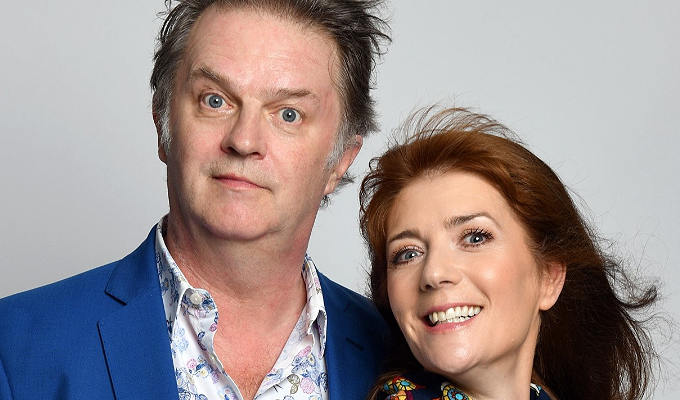Christie & Doyle's Axis Of Evil
Note: This review is from 2005
Review by Steve Bennett
Double acts, they always say, are like a marriage. Odd then, that there have been so very few since George Burns and Gracie Allen.
Perhaps it’s a power thing. Comedy partnerships are invariably mismatched – but have a dominant male, and it’s unappetising bullying; a dominant female and she’s a humourless battleaxe.
Fringe newcomers Bridget Christie and Andy Doyle overcome this by the convenient happenstance that he’s gay. There’s no relationship worries, and he can be the poor misunderstood, artistic type to Christie’s no-nonsense – and sometimes slapsticky violent - practicality.
For this, their debut, they’ve chosen to cover evil. So you might think Osama Bin Laden, Pol Pot, Hitler or Stalin might make an appearance.
Sure, enough, there’s a nod to them. And, musically, to that other male-female double act that put Christie’s home town of Gloucester on the map: Fred and Rose West.
But this is not the thrust of the show. They’ve taken their theme very broadly, so to them, simple bad manners is evil – which gives them a wide scope on which to base their mix of sketches.
Best of the lot involves the emotionally taught married couple, in which the wife flips her feelings on a sixpence, switching in an instant from the lovey-dovey to the embittered bitch, much to his mournful incomprehension. They are both a wonderfully observed, well executed, inventions - if Catherine Tate should ever be in need of a couple of new characters, she needn’t look much further that this.
Other highs include the effective scene-setter involving an evil potato-headed mannequin and the bizarre, and quite creepy Brief Encounter-esque encounter on a station, worthy of Dame Celia Molestrangler herself.
Not everything’s so strong. The well-to-do couple spouting barely-veiled racism is saddled not so much with their politically incorrect lines, but with the fact there’s little to say. And most of the solo links are found wanting.
Their forte is inappropriate language – not rude words, but a clever mangling of English and her grammar. There’s a knowing edge to it, too. Christie’s savage Irish nun Sister Alopecia is quickly followed by a discussion about how it’s a caricature every female character has ever found material in.
Another strength is that they don’t panic in a relentless rush to get to the next gag. That it takes the unhurried Doyle an age to awkwardly remove that shop dummy from the stage is a delight of tortured embarrassment. But the flipside of this is that whenever a sketch doesn’t work, it always seems overlong.
But despite these complaints, this is a confident, sporadically brilliant, if still-patchy debut. Most of all, though, Christie and Doyle have an obvious promise which is not always found in the myriad of sketch acts that populate the Fringe. You could do a lot worse for an early-evening excursion into this much (if often rightly) maligned genre.
Review date: 1 Aug 2005
Reviewed by: Steve Bennett






